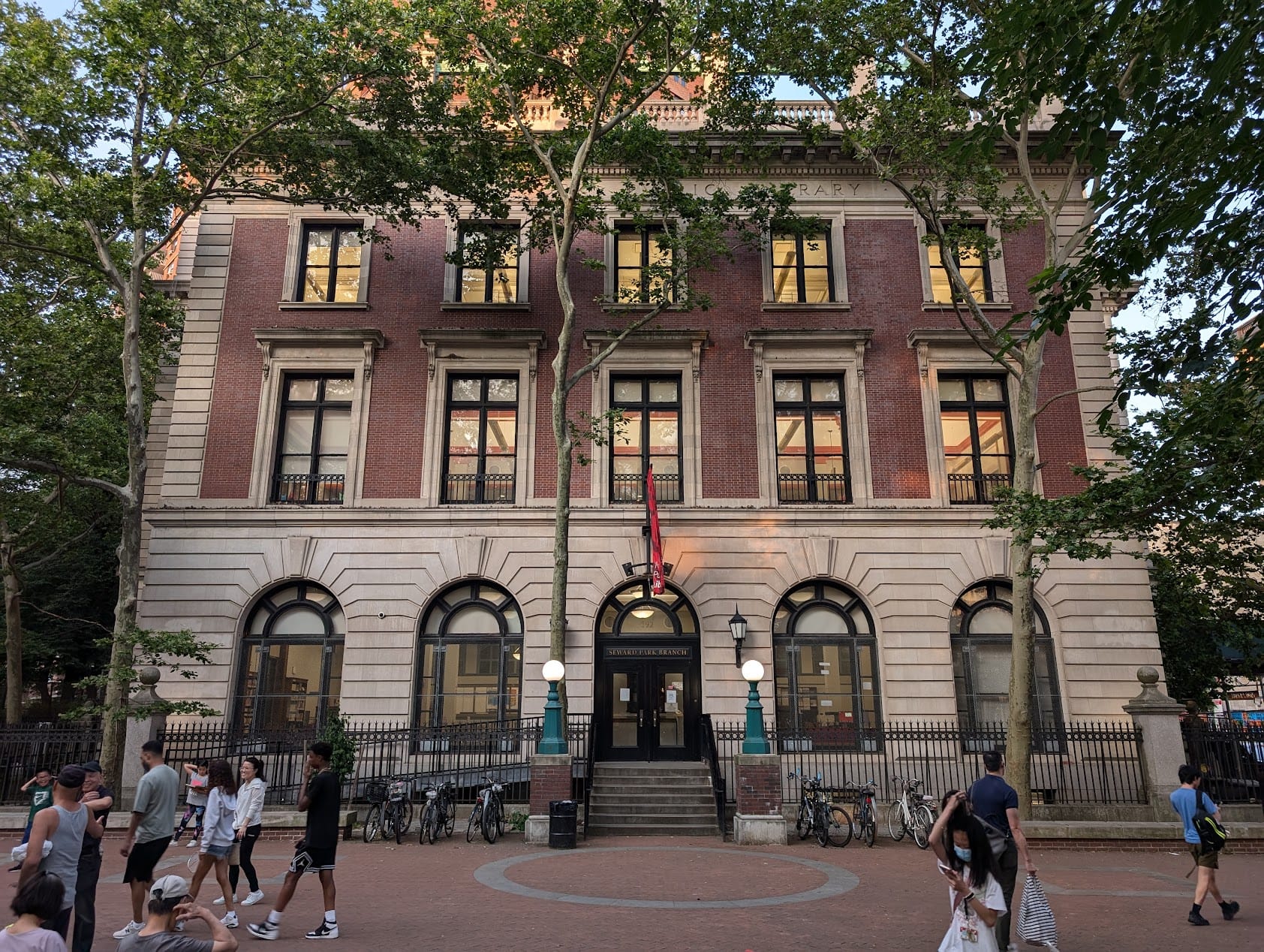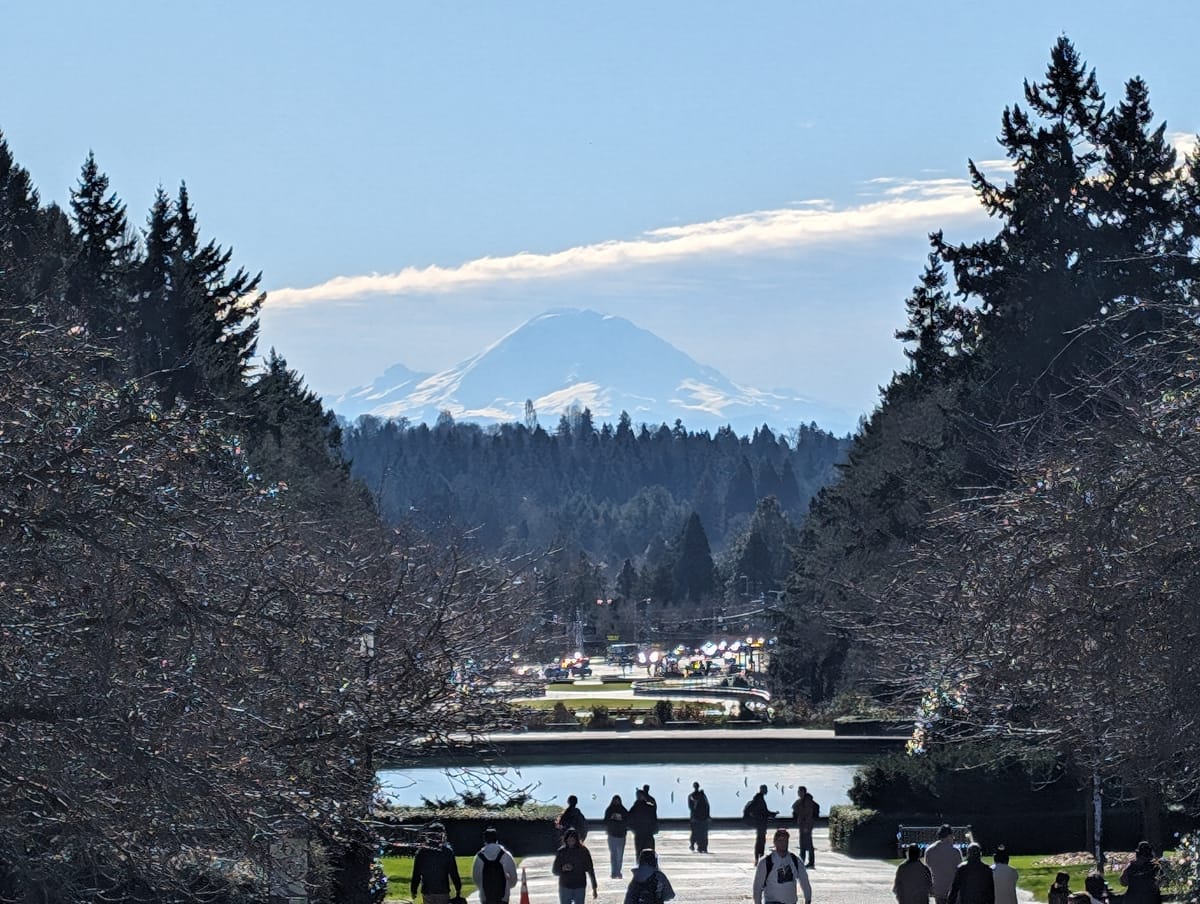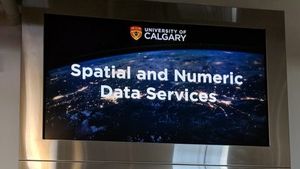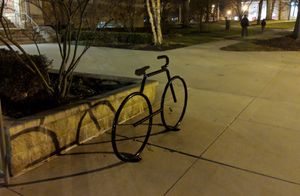I am one year into my two-year term as a Distinguished Practitioner in Residence at the Information School at the University of Washington. I have been fascinated to see academic life from the inside, as it were, even though I am a visitor rather than fully domiciled. A bonus has been how much we have enjoyed Seattle, the city, and its amazing watery, mountainy and islandy hinterland.
I have been teaching two courses, one that I created myself from scratch, and one almost oven-ready that I adapted. The new course was on library collaboration and partnerships, a topic that has always seemed to me to be underexamined. I am also about to begin a small research project looking at some of the characteristics of collaboration. I am lucky that the Orbis Cascade Alliance is on my doorstep here in that regard. The other was on management, a course that is mandatory for all MLIS students, and which is viewed with some ambivalence by some.
At this mid-way point, I thought I would reflect a little on my newfound teaching experience, understanding that what I say is not necessarily unique or surprising.
Teaching and baking
Teaching for the first time presents a steep learning curve. Starting out by developing a new course was in hindsight somewhat optimistic. Once the baking analogy occurred to me, I could not forget it:
Teaching for the first time while developing a new course is like being in the kitchen on your own, with no recipe, baking a loaf of bread for the very first time. Except that you have an audience who observe your every move, and you cannot throw it away if it doesn't work out.
But I was not quite on my own. Several people helped, and I am especially grateful to my colleague and Associate Teaching Professor, Chance Hunt, who generously and empathetically stepped in to calm my churning and to help clear a path, and to Sue Morgan, Teaching and Learning Specialist in Learning Technologies at the iSchool, who patiently helped me climb the Canvas learning curve. They each saved me from some foolishness; what remained was mostly my own.
A major takeaway was that I needed to talk less!
This is a short piece, so here are some brief takeaways:
- I succumbed early on to the common newbie hubris of imagining that I was there to communicate my knowledge and experience. However, what I was really there for was to facilitate learning. My first course outing needed more interaction and engagement with issues, and rather less of my powerpoint, thoughtful and tasteful though it was. A major takeaway was that I needed to talk less!
- Understanding that good teaching is both learnable and a craft, I had spent some time in preparation reading around the topic. However, without the goalposts of experience, I was overwhelmed by the pedagogical firehose. To reduce confusing superabundance, I returned to The new college classroom by Cathy Davidson as a pragmatic guide, its main recommendation being that I had met Cathy at the interesting Amical Conference shortly beforehand.
- That said, one can only do so much in one course, and one of the things I most enjoyed was digging into collaboration and thinking about how to sketch out the collaborative space. I also really liked how it made me reconnect with different types of libraries. I enjoyed, for example, exploring public libraries as social infrastructure and the importance of social capital based on Klinenberg's Palaces of the People. I was struck again by the differential attention in the literature to different kinds of libraries, noticing how community college libraries, for example, did not receive as much attention as other academic libraries.
- I was curious to see how my assigned readings were received. I do not wholly trust my judgements here, as they are impressionistic, supported by limited end-of-course-feedback. In general, the more abstract or theoretical pieces were less popular than ones which communicated experiences, issues or problems. Not too surprising, perhaps, but I did also wonder about the overall balance between theory and practice. I noted how, especially in the collaboration course, practitioner perspectives in the literature greatly outweighed LIS academic ones.
- I am very grateful to the guest speakers who gave generously of their time, expertise and opinions. They brought energy into the class. I am thinking of invites now for this year. A couple of things really struck me in terms of learning. The first was to communicate that libraries are social organizations, with all that that means in terms of relationships, decision-making, persuasion and influence. I emphasized this throughout. The second is that collaboration and partnership is central in many ways to what libraries do from an operational point of view, but is also so important for creating the networks and communities of practice that do so much to foster learning and innovation. Guest speakers did much to communicate the experiential reality of these two points, alongside the description of libraries, services and initiatives.

Students
The main reason I took this position was that I knew it would be good to be challenged and engaged by different perspectives. I was interested in what animated and interested those beginning a career in libraries, archives or related organization. This aspect of the work has been very rewarding, and I have learned so much. I am also encouraged by the energy and sense of purpose I encountered among so many students, and I know they will make an impact. Here are some thoughts ...
- In both of my classes the majority of student career interests broke down approximately evenly between academic and public libraries. I was also interested in the strong archival interest, partly overlapping with the academic interest (in archives and/or special collections) and partly motivated by community archives, or specialist archives of various types. It did strike me in discussions that archives work often appealed where it made direct connections with particular communities of interest, distinctive materials, or reparative recognition and remembrance.
- There was a strong focus among students on social justice and on the agency of libraries and librarians in their communities. This is a clear emphasis of the UW iSchool and course options reflect this, as does the general ethos. This was refreshing to see, acknowledging also that political and advocacy skills will be very important in the library environment students are entering.
- In the management class (I taught in parallel and in close coordination with Chance) we asked students at the beginning of the year how many were interested in being managers. I was struck that the interest was not stronger, although a repeat question at the end of the course did suggest that some opinions had shifted. Some students went into the class thinking of management solely in terms of staff supervision. Following Linda Hill, I tried to consistently emphasize that management involves managing oneself and one's network of relationships, in addition to one's team. And of course, organizational management, including strategy, marketing, organizational culture, and so on, is also central and may be new to some. I observed how several students overcame a prior antipathy to the idea of marketing and 'brand' to realize that a broad approach to positioning the library favorably within its community was actually very important.
- Teaching presents the classic curse of knowledge situation. In summary it is very difficult to unknow something that you already know, and it can be difficult to imagine what it is like not to know it. This creates a potential communication gap. To close this gap we have to step outside our own usual standpoint. For example, I was initially guided by my own interests which are often organizational and strategic, but soon recognised the strong class interest in operational issues. Talking about collaboration between libraries also relies somewhat on knowledge of the object of collaboration (for example a shared ILS or shared content negotiation and licensing) and this opens out into other issues, open access or concerns around ebook licensing, for example. Similarly, in a management class, one can expect that students may have a variety of organizational and supervisory experiences, but, naturally enough, less acquaintance with some of the ways in which libraries are organized or funded. In the management class, for example, I tried to emphasize that the library is not (usually) a stand-alone entity - typically it is accountable to a city, university, or some other parent organization. Even where it reports to a board, the local government agency may appoint some board members. I learned that I need to work hard to try to traverse the gap, thinking about what is covered, using more analogies or examples, for example, and ensuring that participants are comfortable in discussion and questions. Guest speakers are very important here, bringing varied and rich experiences into the class.
- I tend to resist generational (and other) classifications, but I was struck by how direct and candid student feedback could be. I was grateful for the often thoughtful and constructive suggestions for improvement. This is certainly true of the management course. It is especially true of the collaboration one, given it was my first outing and it was new material. I am currently looking at some refocusing based on class observations. I might even lose some slides!
Systems and services
I have written much about library systems and services. My perspective tends to be informed by my own usage, by conversations with librarians, and also by the fact that I have worked for organizations that have built systems and services that libraries rely on, both in production and in R&D mode. I was fascinated to be in a somewhat different position here, as a faculty member and teacher needing to use library resources in the construction of courses and in my other work.
I have had a more tangential relationship to instructional technology, but was looking forward to exploring Canvas and some other tools. Given the firehose note above, I did stick to the core and to a small number of tools.
Here are some slightly random observations about my experience.
- It was a great pleasure to have the resources of a large library available again. Browsing in the stacks may not be quite the adventure it once was, but being able to prospect large reservoirs of print and electronic resources is a joy. While a significant proportion of articles may now be available open access, having access to a large, licensed collection makes a big difference. What was more novel for me was being able to access a large number of ebooks at the chapter level, both for my own use and to add to course readings. The 'access gap' between those able to use a well-resourced library and those who do not have such access is still very wide.
- As library consortia were a central emphasis in the collaboration course, I was very interested to see the benefits of borrowing through the shared Orbis Cascade Alliance system in action: I appreciated receiving items from other Alliance members. The University has just joined BTAA, so the library will be participating in BTAA library initiatives in due course. Although I may be finished my term by then, I will be interested to see how this works out alongside the Orbis Cascade alliance, especially given my work with BTAA in a previous life.
The 'access gap' between those able to use a well-resourced library and those who do not have such access is still very wide.
- I enjoyed the opportunity to interact with library colleagues. I also admired how library liaison Alyssa Deutschler solicitously worked with iSchool colleagues, readily provided expert advice, participated in events and instruction, and generally modeled the value of the relational library.
- I have written much about the friction in the library 'discovery to delivery' (D2D) chain over the years. It is a challenge, bringing a heterogenous set of resources into a (more or less) unified environment of use, and creating required connections across discovery, authorization, and fulfilment options. A lot of plumbing is involved, and unfortunately some of this still shows. When things work well, it is very impressive (and the deployment of LibKey helps here), however the experience is occasionally not very well-seamed, let alone seamless. Given the state of the art of the involved technologies, the small number of available products to get this work done, and the general reliance on the same set of vendors, this experience is much the same in most libraries. It is not something specific to the University of Washington or to the Orbis Cascade Alliance. While I appreciate the complexities, and have experienced the heavy lift on the system/data provider side also, it is disappointing that things are not better by now.
- This may be one of the places where AI might be helpful in terms of better connecting that D2D workflow, and I look forward to trying out the Primo Research Assistant in my current environment. In general I have been interested to observe the careful way in which AI is being introduced into discovery and other products offered to libraries.
- This experience of the library D2D apparatus matters for a variety of reasons. One in particular is on my mind, as I have been thinking about perceptions of libraries in the academy in the context of LIS Forward (an initiative of iSchools looking at the future of Library and Information Science education and research within iSchools and the academy). While the D2D setup is actually quite impressive when you know a little about the moving parts (proxy, knowledge base, LibKey, etc), it does not necessarily seem that way to the non-initiate. It does not showcase the library as a technological leader or innovator; quite the reverse in fact, as the library discovery experience feels like it is from an earlier period. Faculty or students cannot be expected to know about the technologies or products that are available to the library to build this experience.
- I was actually pleasantly surprised by Canvas. I thought it did a good job of supporting some complex workflows in an integrated way. While it may constrain the more adventurous, I appreciated the integrated approach and the continuity across courses. Of course, it can behave inconsistently (sometimes save is automatic, sometimes not). I appreciated that it got the job done and that once you were sufficiently high up the learning curve, you could put your energies elsewhere. As I noted above, I was grateful here to receive a lot of help from the Learning Technologies unit.
- I really like Papers from ReadCube, a Digital Science company. I have used Mendeley and Zotero in the past, but my incentives were not strong enough to climb very far along the learning curve. In my current role, the incentives are stronger, but I have actually also found Papers more straightforward to use. It also works very nicely with the library systems infrastructure mentioned above, and, when all the connections work well, it is like magic to move from publisher page to well formatted citation and stored PDF smoothly. One frustration was the treatment of books. It does not automagically pick up a citation from Amazon or WorldCat, for example, which seems like a miss all around. There was recently an AI upgrade which added some capabilities, including asking questions of a PDF. (This is a small example of how we will interact in more ways with documents in the future.)
- I found the annotation tool Hypothesis very useful, and while not universally loved by students, it did add a dimension to reading and discussion, especially if used in moderately sized groups. Again, it is nice the way it manages a workflow smoothly.
However, without the goalposts of experience, I was overwhelmed by the pedagogical firehose. ... I found developing my first course quite stressful as I did not know what I did not know.
- I found developing my first course quite stressful as I did not know what I did not know. I made the mistake of trying to build the initial outline in Canvas. This made it difficult to see the course as a whole, and difficult to work on trying to change staging of topics, speakers and exercises. Probably the best advice I received during the year was when Chance suggested I shifted this planning to a whiteboard. In fact I ended up using stickies stuck to the whiteboard at work, and duplicated on the bedroom wall in our small rental. It was simple ... and liberating.

Education and career preparation
My experience so far has caused me to reflect quite a bit on library education.
The MLS has always been a challenge, given the variety of skills and specialties at play in libraries. This has become even more so as libraries continue to evolve from being transactional and collections-centered to being relational and community-centered. This means that they manifest interesting educational and research issues, from the technical, to the management, to the social and political.
In one program, how do you balance coverage of broad technical skills and appreciation, nurturing community – whether it is in busy urban settings or around student success and retention –, the management of complex social and political organizations, and the (inappropriately named) soft skills which are so central to so many aspects of work (teamwork, advocacy, empathy, self care, ...)?
It also prompts reflection on the relationship between research and practice, and on how the library community generates ideas and innovation. There are plenty of topics to return to.
It is a critical time for libraries, and so a critical time for library education and research. I am looking forward to year two!
Acknowledgements: Thanks to Alyssa Deutschler, Chance Hunt, Sue Morgan, Denise Pan, and Lauren Pressley for their helpful review of an earlier draft. I am especially grateful to Gabrielle Garcia (UW MLIS '24) for a thoughtful reading and helpful suggestions. While their feedback improved the final piece, all opinions are my own and they do not necessarily agree with all I say!
Pictures: I took all the pictures, and also made a lot of soda bread during the pandemic.
Other entries mentioned:









